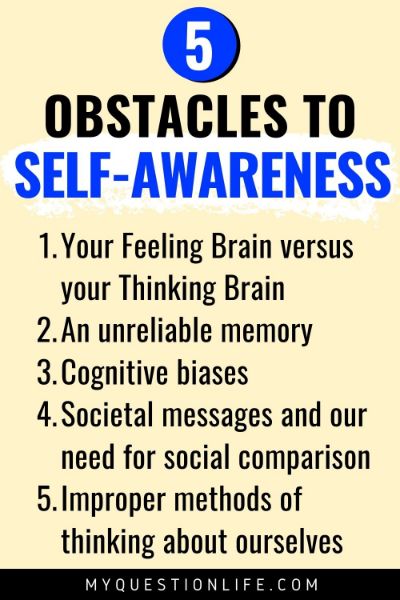The obstacles to self-awareness.
Being self-aware is one of the most important skills you can have. But there are a lot of obstacles to self-awareness. We all think we’re more self-aware than we actually are-it’s human nature
Before I get into what’s stopping self-awareness, here’s a story theme that might sound relatable.
My co-teachers and I recently faced a new challenge: adapting our curriculum to teach online. My school’s transition to online learning was not necessarily the smoothest. Many of us had little to no experience with the new format. In the novel situation, new challenges arose that forced our administration to send out weekly directives. Often, the feedback focused on making our online curriculum easier to understand and more manageable for students.
This “blanket feedback for everyone” method had one major flaw. It assumed that we could be self-aware enough to know when it applied to us.
One of the teachers I worked with–let’s call him Mr. X-complained about these new directives. “I’m already doing all these things! I’ve made sure my course is easy to understand,” Mr. X said.
I stifled a laugh. His course was one of the most confusing ones! Countless students had complained to me about how they felt overwhelmed by his class. How could he lack the self-awareness to realize it?
Yet… I also sat there thinking the same thing about my course. I’m already doing all these things, I genuinely believed. How was I any different than Mr. X?
How do we know when we’re lacking self-awareness? And what makes it so difficult to be self-aware?
Fortunately, the more we understand the obstacles to self-awareness, the more self-aware we can become.
.
What Self-Awareness Is and How Many People Lack Self-Awareness
Self-awareness is our ability to identify and monitor our feelings, thoughts, and actions. It encompasses knowing who we are, as well as how our actions are perceived by others.
On a base level, it’s being able to say, “This is what I’m doing, this is what’s motivating me, and this is how it’s affecting others.”
Self-awareness is a crucial skill in today’s society. Studies have shown over and over how critical being self-aware is for a happy, successful life.
The benefits of being self-aware include having:
- Stronger relationships
- Better decision-making
- More success
- Better overall moods
- Increased productivity
The concept of self-awareness – as well as its benefits – sounds straightforward enough. Yet only about 5-10% of the population is self-aware (even though 90% of the population thinks they are).
Why do so many of us lack self-awareness?
.
The Outdated Brain behind the Obstacles to Self-Awareness
I want you to think of the oldest, usable building that you know. Maybe it’s an old house or a remodeled museum. If it’s still in use, chances are that it’s been modernized over the years with things like electricity, internet, etc.
However, it probably still has some remnants of its origins, whether it be an old foundation or chimney. New structures were built around the ancient origins.
The same thing happened with human evolution. As our species evolved from reptiles to monkeys to the good-looking beasts we are today, some of the original foundations remained. Our bodies adapted, but our most fundamental brain functions remained.
Fight-or-flight is a well-known example of these fundamental brain functions. Millions of years ago, our fight-or-flight instincts quite literally kept us alive. As did our response to fear (run away, that animal will eat you) and shame (if this group of people rejects you, you’ll be alone and helpless).
However, as our species and world adapted, these necessary functions began to have negative consequences. Namely, they get in the way of our self-awareness.
Without further ado, let’s dive in.
.
5 Obstacles to Self-Awareness (and Why They’re Holding You Back)
.
1. Your Feeling Brain versus Thinking Brain
A whole lot is going on within our craniums. We can think of our brain as divided into two parts: a Thinking Brain and a Feeling Brain.
Your Thinking Brain is all of the things you’d expect: your thoughts, critical questions, and reasoning. It’s also what we think is in control.
Unfortunately, your Feeling Brain has a lot more to do with it than you know. It’s the base of all of our most fundamental emotional responses. (It’s also literally at the base of our spinal cord and brain connection). As a result, our emotions not online drive our behavior, but they often do so without us even realizing it.
It’s not difficult to see how these underlying emotions cause a lack of self-awareness.
Furthermore, while our Thinking Brain is rational and objective, our Feeling Brain is not. Our body reacts on impulse and emotions (even if they’re incorrect) rather than reason. This further hinders our self-awareness of our decision-making and reactions.
.
2. An unreliable memory
It’s not just our decision-making that we wrongly trust. We also falsely believe that our memory is reliable and accurate. I mean, why wouldn’t we? Our memories feel real.
Unfortunately, this outlook is also a barrier to self-awareness. As real as they may feel, our memories are super unreliable. Depending on our emotional state, biases, and need for certainty, our brains change our impression of reality.
Ten years ago, my cousin lent me her Friends DVD collection. I have a distinct memory of her gifting me the entire set five years later. (Yes, I did hold onto the borrowed items for five years… my bad). When I casually mentioned this to her, she denied it completely.
How can we both 100% believe two conflicting versions of the truth?
There are many reasons our memory is unreliable. If we’re affected by a trauma or negative emotion, our brains might not form an accurate memory in the first place. We’re wired to crave certainty, so our brains sometimes fill in gaps without us realizing it. Finally, we can fall prey to “created memories,” which are manipulated versions of the truth that we accept.
Since being self-aware is all about understanding ourselves, our unreliable memory makes us less aware of actual events or our role in them. We lack self-awareness of what actually happened.
.
3. Cognitive biases
Ah, biases – the army of gremlins causing obstacles to self-awareness. A primary reason we lack self-awareness is that we are strongly influenced by cognitive biases. These biases are deeply rooted into our thought patterns without our awareness.
In fact, they’re so integrated into our thinking, scientists disagree on the specific number of biases that exist. We do know it’s at least 50 and more than likely over 100.
Cognitive biases cause us to create our own “subjective reality.” We create our own meaning from events, which often aren’t entirely objective. A few biases include:
- Negativity bias – our brains focus more on negative than positive stimuli
- Loss aversion – our brains react more strongly to losing something than gaining something
- Confirmation bias – our brains seek information that supports our preexisting beliefs and disregard contradictory information
The list goes on and on, but it’s important to acknowledge that our biases are rooted in our evolutionary, outdated brain. For example, negativity bias allowed our ancestors to focus on and avoid dangerous elements. Similarly, loss aversion made us protect our life-saving resources at all costs. Confirmation bias allows our brains to handle the influx of information we receive every day.
How do these biases affect our self-awareness? Being self-aware means that we can objectively interpret the evidence about ourselves and our impact. Cognitive biases interfere with how we receive this evidence, often making us inaccurate with our self-assessment.
.
4. Societal messages and our need for social comparison
Another fun tendency from our evolutionary roots is our need for social comparison. Because social hierarchy has always been so crucial in the animal kingdom, we’re still evaluating social status – even if we don’t intend to.
This makes us extremely influenceable by societal messages. Unfortunately, a few of our most pervasive societal messages discourage self-awareness. I don’t know about you, but I don’t see advertisements popping up for “Self-awareness: learn the truth about yourself.” Instead, I get all sorts of ads telling me what to buy, how to change, and what I should be.
When we listen to cultural myths, we begin to believe:
- We are special and extraordinary
- We can only be successful if we meet unrealistic metrics of success
- We should value an individualistic mindset
- Our worth is tied to our material goods
Then, we compare ourselves to others, feel bad, and move toward a lack of self-awareness. We’re unable to separate ourselves from these societal myths.
The constant media exposure further prevents us from being self-aware outside of these cultural norms.
Want to read more about this? Check out 7 Ways Society is Tricking You About What is Meaningful.
.
5. Improper methods of thinking about ourselves
As if all these influences aren’t bad enough, there’s another huge element with the obstacles to self-awareness: our faulty attempts at introspection. Dr. Tasha Eurich, an expert in the subject, found: “Thinking about ourselves isn’t associated with knowing ourselves.”
Basically, when we try to learn more about ourselves, we aren’t always increasing our self-awareness. Sometimes, we’re actually making it worse.
My cousin loves to take on deep, introspective questions. She dove into her past, analyzing everything from childhood events to her entire family history. Full of curiosity, she wanted to know why she was the way she was.
Eventually, all the questions caught up to her. After she couldn’t find the answers she was looking for, she began to feel worse than before. The disappointment and frustration led to her lacking self-awareness.
My cousin, like many of us, was falling into some common traps. Introspection isn’t always helpful for self-awareness, particularly if we:
- Try to excavate our unconscious even though it’s impossible
- Try to find the “why” behind our behavior
- Ruminate over fears, shortcomings, or insecurities
- Over-analyze specific events, whether in writing or in conversation
While our culture sometimes encourages these behaviors, they’re actually giant obstacles to self-awareness.
Dr. Tasha Eurich’s book is the best resource I’ve found in regard to self-awareness and the research behind it. Check it out here: Insight: The Surprising Truth About How Others see Us, How we See Ourselves, and Why the answers Matter More than We Think.
.
.
How are the Obstacles to Self-Awareness Affecting You?
If you understand how these five ways are obstacles to self-awareness, you’re already more self-aware than most. Meanwhile, if you don’t think they influence you that much, you’re probably getting caught up in your own biases.
Remember, only 5-10% of the population is actually self-aware. That means that roughly 80% of the population thinks they’re more self-aware than they actually are.
Want to see how self-aware you are? You can take this free, quick Self-Awareness Test. You can also check out 6 Signs You Lack Self-Awareness to assess whether you might not be as self-aware as you think.
.
Conclusion: Obstacles to Self-Awareness
Self-awareness is a valuable skill with enormous benefits. Still, most of us lack self-awareness. However, this isn’t necessarily our fault. There are powerful obstacles to self-awareness, including:
- Your Feeling Brain versus Thinking Brain
- An unreliable memory
- Cognitive biases
- Societal messages and our need for social comparison
- Improper methods of thinking about ourselves
The more you understand what’s holding your self-awareness back, the more you can work to fight against these influences. Ultimately, you can become more self-aware and reclaim your life.






